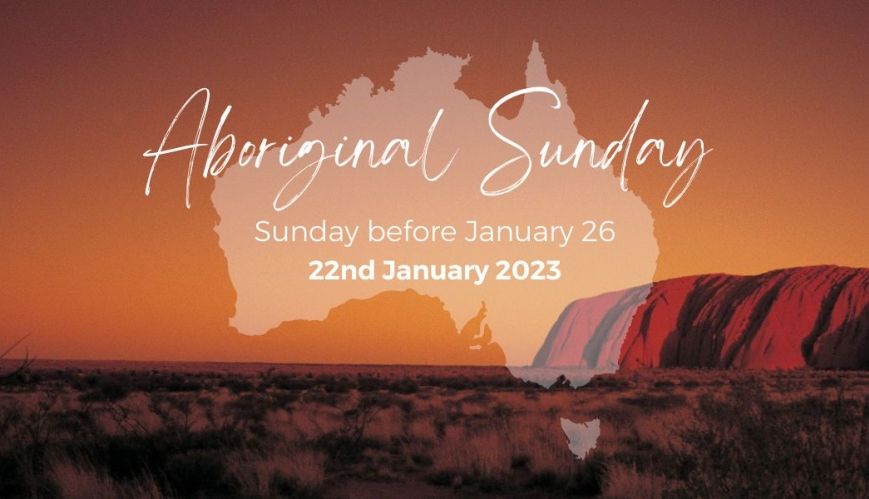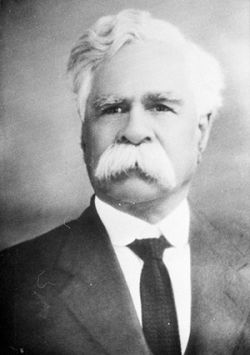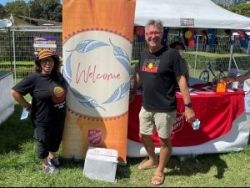Hope and mourning on Aboriginal Sunday and beyond

Hope and mourning on Aboriginal Sunday and beyond
22 January 2023
Today, The Salvation Army joins many around the country to observe Aboriginal Sunday. Photo courtesy Common Grace. For more information and resources, click here.
Today is Aboriginal Sunday, a day to “hear voices from the past so together we can walk into the future,” says the team from Common Grace, a movement of individuals, churches and communities pursuing Jesus and justice together for the flourishing of all people and all creation.
“This day is both a day of lament for those who have died and to honour their memory,” explains Sue Hodges, Wiradjuri woman and The Salvation Army Aboriginal and Torres Strait Islander Engagement Coordinator for the NSW/ACT Division. “They did not die in vain.”
Sue shared the example of Aunty Jean Phillips, one of today’s most senior Aboriginal Christian leaders. “Aunty Jean is honoured for her devout work for social justice and human rights, but she pushes the names of others before herself to share their legacy and that they knew the Lord and heard his calling to make a difference in this country.”
Sue will lead an Aboriginal Day service at Cessnock Corps in the Hunter Region of NSW today. For a list of churches across Australia holding a service today, click here.
The day in history
“Australia has a dark past where Aboriginal and Torres Strait Islander peoples were deprived of their human rights,” Sue says. “It’s important to remember these legends of the past, these warriors, so we can hear the voices that echo the past and advocate for those rights to be shared and enjoyed.”
 William Cooper was instrumental in the fight for justice, equality and full citizenship for Aboriginal peoples.
William Cooper was instrumental in the fight for justice, equality and full citizenship for Aboriginal peoples.
During this week, Aboriginal and Torres Strait Islander peoples, churches and many others throughout the Australian community will remember and celebrate the dreams of Elders and Christian leaders, including Yorta Yorta Countryman William Cooper, who was instrumental in the fight for justice, equality and full citizenship for Aboriginal peoples.
On 26 January 1938, a group of Aboriginal men and women met in Sydney to demand equality and full citizenship for Aboriginal peoples. It became known as a Day of Mourning.
Aboriginal leader and Yorta Yorta Countryman William Cooper then led a delegation that presented Prime Minister Joseph Lyons with a proposed national policy for Aboriginal people. This was rejected because the Government did not hold constitutional powers in relation to Aboriginal people.
After the Day of Mourning, there was a growing feeling that the Day of Mourning should be an annual event. In 1939, William Cooper wrote to the National Missionary Council of Australia to seek their assistance in supporting and promoting this. Australian churches were asked to set aside the Sunday before 26 January as Aboriginal Sunday, a day for Christians to act in solidarity with Aboriginal peoples and the injustices being experienced. It is believed that the first Aboriginal Sunday took place in 1941.
“Today, and throughout this week, we celebrate the dream of our Aboriginal and Torres Strait Islander Christian Leaders/ Elders, such as William Cooper,” shares Sue. She explained that, as well as his role in the Day of Mourning, William Cooper, with others, established the Australian Aborigines League and petitioned King George V for Aboriginal representation in parliament.
“May his immeasurable legacy inspire us as we continue to act for justice for Aboriginal and Torres Strait Islander peoples today,” Sue emphasises.
Legacies and future change
Sue also outlined other significant contributors, such as Aboriginal Christian Leader Pastor Sir Doug Nicholls (Yorta Yorta Countryman), who was William Cooper’s great-nephew, pastor of the Fitzroy Church of Christ (the first Aboriginal Church of Christ in Australia) and became Governor of South Australia in 1976. The advocacy of Sir Doug Nicholls contributed to the success of the 1967 referendum to change the Constitution and allow the Australian Government to make laws for Aboriginal and Torres Strait Islander people and include them in the census.
Aboriginal Christian Leader Aunty Pearl Gibbs (Ngemba woman) was a leading Aboriginal activist in the 1900s, advocating especially for Aboriginal civil rights and the rights of Aboriginal women and children. She was a key member of the Aborigines Progressive Association and a lead organiser of the Day of Mourning protest in 1938. In 1956, Aunty Pearl Gibbs co-founded the Aboriginal Australian Fellowship, which brought together Aboriginal people and non-Indigenous allies to campaign for equality and citizenship rights for Aboriginal peoples, including the right to vote.
Aboriginal Christian Leader Pastor Don Brady (Kuku Yalanji Countryman) was a Methodist pastor, political activist and proud cultural man. Pastor Don Brady grew up on Palm Island and undertook theological training with the Aborigines Inland Mission and the Methodist College. In 1964 Pastor Don Brady moved to Brisbane (Meanjin) to pastor the West End Methodist Mission.
“Pastor Don Brady was compelled by his faith to boldly advocate for Aboriginal rights, and we also thank God for his leadership,” says Sue.
“It’s important to piece all this together. It’s no accident that the theme of National Reconciliation Week 2023 is ‘Be a Voice for Generations’ and that NAIDOC Week’s theme is ‘For Our Elders’.
 The invitation is extended to all to join Aboriginal people in acknowledging 26 January in lament, prayer, and action for justice. Photo courtesy Common Grace.
The invitation is extended to all to join Aboriginal people in acknowledging 26 January in lament, prayer, and action for justice. Photo courtesy Common Grace.
“The referendum for the Voice to Parliament is expected to be held this year, so it’s going to be a big year for progress.”
25 January
To complement Aboriginal Sunday, Sue will also lead a #ChangeTheHeart Service on 25 January. For more information, click here
To watch Aunty Jean Phillips and other elders lead a #ChangeTheHeart service at 7.30pm AEST, click here
For further streaming, TV and radio links, click here.
 Sue Hodges (left) with Rod Yule at the Yabun Festival 2022.
Sue Hodges (left) with Rod Yule at the Yabun Festival 2022.
26 January
On 26 January, Sue will be part of a Salvation Army team at the Yabun Festival, the largest one-day gathering and recognition of Aboriginal and Torres Strait Islander cultures in Australia, held annually on 26 January on the traditional lands of the Gadigal people in Sydney.
Sue and the Salvation Army Aboriginal and Torres Strait team invite readers to join them in reflecting and acknowledging 26 January in lament, prayer and action for justice.
For information on ways to do this, click here
“Remember the days of long ago; think about the generations past. Ask your father, and he will inform you. Inquire of your elders, and they will tell you” Deuteronomy 32:7 (New Living Translation).
Comments
No comments yet - be the first.